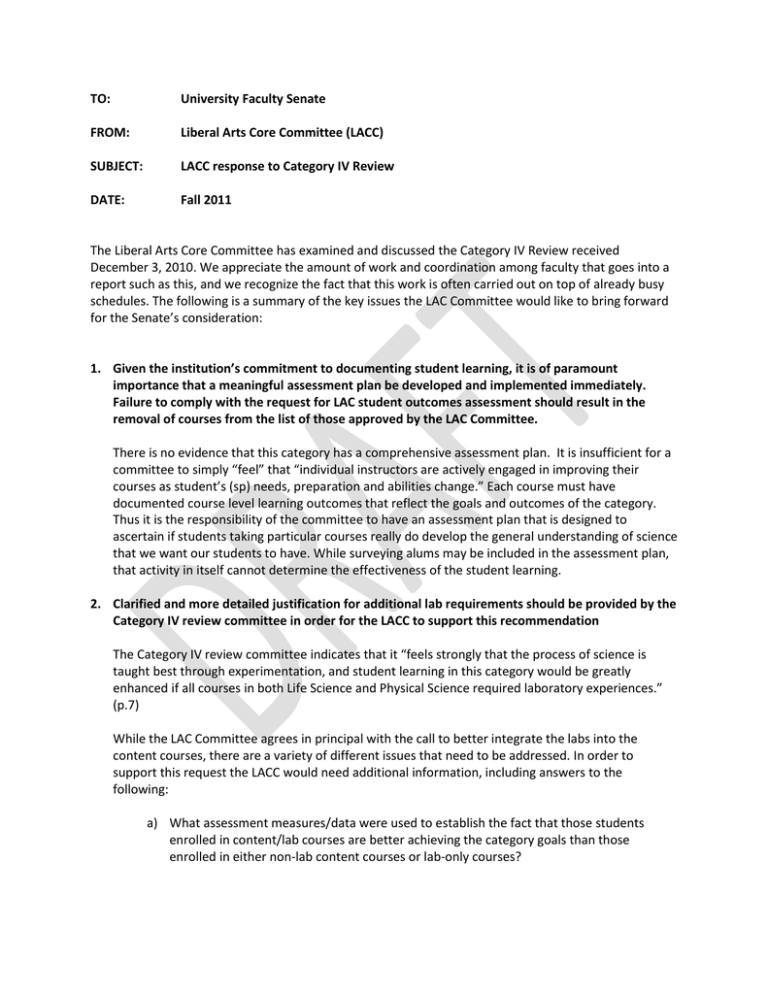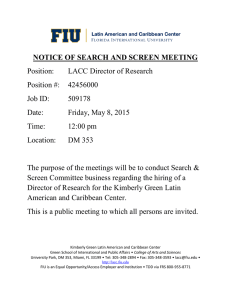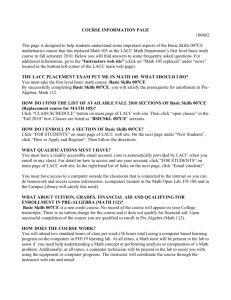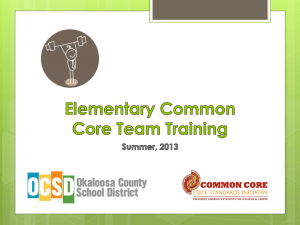TO: University Faculty Senate FROM:
advertisement

TO: University Faculty Senate FROM: Liberal Arts Core Committee (LACC) SUBJECT: LACC response to Category IV Review DATE: Fall 2011 The Liberal Arts Core Committee has examined and discussed the Category IV Review received December 3, 2010. We appreciate the amount of work and coordination among faculty that goes into a report such as this, and we recognize the fact that this work is often carried out on top of already busy schedules. The following is a summary of the key issues the LAC Committee would like to bring forward for the Senate’s consideration: 1. Given the institution’s commitment to documenting student learning, it is of paramount importance that a meaningful assessment plan be developed and implemented immediately. Failure to comply with the request for LAC student outcomes assessment should result in the removal of courses from the list of those approved by the LAC Committee. There is no evidence that this category has a comprehensive assessment plan. It is insufficient for a committee to simply “feel” that “individual instructors are actively engaged in improving their courses as student’s (sp) needs, preparation and abilities change.” Each course must have documented course level learning outcomes that reflect the goals and outcomes of the category. Thus it is the responsibility of the committee to have an assessment plan that is designed to ascertain if students taking particular courses really do develop the general understanding of science that we want our students to have. While surveying alums may be included in the assessment plan, that activity in itself cannot determine the effectiveness of the student learning. 2. Clarified and more detailed justification for additional lab requirements should be provided by the Category IV review committee in order for the LACC to support this recommendation The Category IV review committee indicates that it “feels strongly that the process of science is taught best through experimentation, and student learning in this category would be greatly enhanced if all courses in both Life Science and Physical Science required laboratory experiences.” (p.7) While the LAC Committee agrees in principal with the call to better integrate the labs into the content courses, there are a variety of different issues that need to be addressed. In order to support this request the LACC would need additional information, including answers to the following: a) What assessment measures/data were used to establish the fact that those students enrolled in content/lab courses are better achieving the category goals than those enrolled in either non-lab content courses or lab-only courses? b) If the pairing of the lab and content course is crucial, should we stop offering the lab-only sections that are not connected to content courses? It is not clear to the LACC how this established delivery method relates to the current request for more labs. 3. The learning outcomes for this category should be more carefully reviewed and, if necessary, revised. The Category IV Review Team references a “Statement of category and subcategory goals, outcomes and competencies” on p. 4 of their report. However, they do not reference the following goals that can be found on the LAC website. Due to the fact that the learning outcomes listed below are not referenced in this report, it is unclear to the LACC whether the review committee considered these outcomes in preparing their report. Current Student Learning Outcomes Category 4: Natural Science and Technology Goal 1: Understanding how science is done. Outcomes/Competencies: 1.1 Understanding the methods of science including observation, induction, deduction, and testing hypotheses. 1.2 Understanding that science is a dynamic process. Current scientific knowledge may be revised or replaced as new and more refined knowledge is gained. Understanding that scientific knowledge does not become accepted until it has been tested and verified. 1.3 Understanding that science requires creativity in asking questions, making predictions, experimental design, development of theories, and critical analysis of data and hypotheses. 1.4 Understanding that experimental methods, data collection, organization, and analysis differ in different fields. However, there is a unity in the goal of observing and understanding nature. 1.5 Understanding that science is a human endeavor. Data collection, documentation, and interpretation are subject to error. Humans are also subject to cultural, political and religious influences that may introduce unintentional bias into the scientific endeavor. 1.6 Understanding the difference between science and technology and understanding the interplay between them. Science and technology are complementary to each other and their concepts are mutually transferable. Goal 2: Understanding the natural world. Outcomes/Competencies 2.1 Understanding basic principles of the natural world. 2.2 Knowledge of fundamental principles of physical and life sciences. Goal 3: Applying scientific understanding Outcomes/Competencies: 3.1 Appreciating the ways in which scientific and technological change have impacted and continue to influence human lives and the environment. 3.2 Evaluating the social, economic and political implications of scientific and technological advances. From 2001 Review (at the time this category included Capstone) 4. A change in the category description should be the result of the assessment of student learning objectives. While the review team called for a change in the category description and proposed a new one, the review document fails to demonstrate (1) why these changes are necessary and (2) how they will improve the category. Instead, the LACC recommends that the faculty who teach in this category develop a comprehensive set of specific learning objectives for the category, which is what is needed for serious outcomes assessment. To this end, a hierarchical and increasingly detailed set of general learning objectives needs to be developed both to guide faculty who are teaching in the category and to enable assessment. In doing so, the LACC would like to reiterate the fact that the learning outcomes for this category should remain less focused on students learning facts from a particular science and more about the types of learning associated with science in general. 5. The LACC cannot support the Review Committee’s recommendation that “Technology” be removed from the category title The review team also called for dropping "Technology" from the category title. At the same time, they lament the inclusion of non-ETS courses in the Capstone requirement. If the desire to include Technology in the LAC is serious, it should be utilized as an argument for a "Scientific Literacy" course/requirement since this could easily accommodate a technology component. 6. The Category IV faculty should conduct a student GPA analysis. The LACC recommends that faculty be monitoring class GPAs, looking for instances of unusually high or low GPAs by course or individual instructor, and then making sure that variation from accepted norms are justified. For instance, we should make sure that instructors learn that it's not acceptable to consistently have high class GPAs in LAC courses. 7. The Category IV faculty should conduct a class size analysis. The report repeatedly calls for smaller section sizes, which can be justified, yet there are also instances of classes being taught in relatively small sections. Such inefficiencies need to be eliminated as a means of freeing up the faculty resources needed to reduce section sizes for other courses. Relatedly, we can argue that classes taught in small section sizes should be doing more than simply lectures and Scantron exams. 8. The LACC recognizes how burdensome this report process can be and will therefore consider revising the current reporting structure in order to: a. Be less burdensome for faculty members (One suggestion that has been raised is that the LAC director will collect syllabi, enrollment data, grade reports, etc. and will provide this data to all categories using a standardized method. b. Facilitate ongoing curriculum discussions and review activities so that the 5-6 year reviews are more meaningful and easier to complete. c. Include “thought” questions that will lead to a more targeted and meaningful analysis of the information collected. d. Include more detailed assessment requirements and expectations. 9. That, as a result of the changes to the review process, a Cat IV Coordinating Committee should be established in order to work with the LAC.


